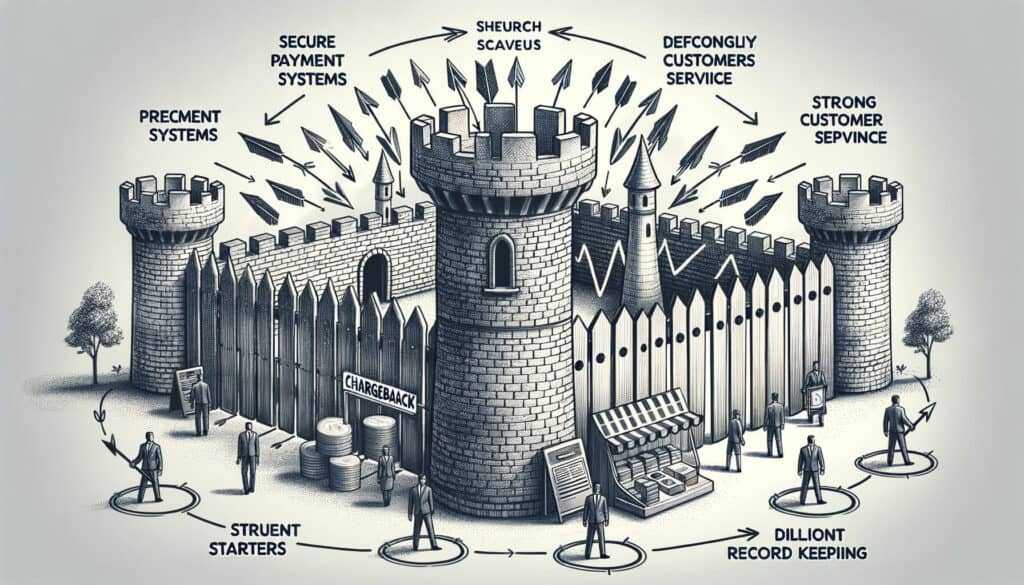
By American February 4, 2025
As a merchant, chargebacks can be a significant concern for your business. Chargebacks occur when a customer disputes a transaction and requests a refund from their bank or credit card company. These chargebacks can result in financial losses, increased fees, and damage to your reputation. However, there is a solution that can help protect your business from these risks – chargeback insurance.
Chargeback insurance is a type of coverage specifically designed to assist merchants in managing and mitigating the financial impact of chargebacks. It provides a safety net for businesses by reimbursing them for the costs associated with chargebacks, including the disputed amount, fees, and other related expenses. In this comprehensive guide, we will delve into the world of chargeback insurance, exploring its benefits, how it works, and how to choose the right provider.
Understanding the Basics of Chargebacks
Before diving into the details of chargeback insurance, it is essential to have a solid understanding of chargebacks themselves. Chargebacks are a mechanism that allows consumers to dispute a transaction and request a refund from their bank or credit card company.
They were initially introduced as a consumer protection measure to combat fraud and unauthorized transactions. However, they have become a double-edged sword for merchants, as they can be abused by dishonest customers or used as a way to avoid paying for goods or services.
Chargebacks typically occur for various reasons, including fraud, dissatisfaction with the product or service, billing errors, or unauthorized transactions. When a customer initiates a chargeback, the merchant is required to provide evidence to prove that the transaction was legitimate and that the customer received the goods or services as promised. If the merchant fails to provide sufficient evidence, the chargeback is approved, and the funds are returned to the customer.
The Importance of Chargeback Prevention Strategies
While chargeback insurance can provide financial protection, it is crucial for merchants to implement effective chargeback prevention strategies to minimize the occurrence of chargebacks in the first place. Prevention is always better than cure, and by taking proactive measures, merchants can reduce the risk of chargebacks and protect their bottom line.
One of the most effective chargeback prevention strategies is to provide excellent customer service. By ensuring that customers are satisfied with their purchases and addressing any concerns promptly, merchants can reduce the likelihood of chargebacks resulting from dissatisfaction. Clear and transparent communication throughout the purchasing process can also help set realistic expectations and prevent misunderstandings.
Another crucial aspect of chargeback prevention is fraud detection and prevention. Implementing robust fraud detection tools and security measures can help identify and prevent fraudulent transactions, reducing the risk of chargebacks caused by unauthorized use of credit cards or stolen identities. Verifying customer information, using address verification systems, and implementing secure payment gateways are some of the measures that can be taken to prevent fraud.
Exploring the Benefits of Chargeback Insurance
Now that we have a solid understanding of chargebacks and the importance of prevention strategies, let’s explore the benefits of chargeback insurance for merchants. Chargeback insurance offers several advantages that can help protect your business and minimize the financial impact of chargebacks.
1. Financial Protection: Chargebacks can result in significant financial losses for merchants, especially for small businesses with limited resources. Chargeback insurance provides a safety net by reimbursing the merchant for the disputed amount, fees, and other related expenses. This financial protection can help businesses stay afloat and avoid bankruptcy in the face of chargeback disputes.
2. Enhanced Cash Flow: Chargebacks can tie up a merchant’s funds for an extended period, as the disputed amount is typically held by the bank or credit card company until the chargeback is resolved. This can create cash flow issues for businesses, especially those with tight margins. Chargeback insurance can help alleviate this problem by providing immediate reimbursement, allowing merchants to access their funds and continue operating smoothly.
3. Reputation Management: Chargebacks can have a detrimental impact on a merchant’s reputation. Excessive chargebacks can lead to penalties, increased fees, and even the termination of merchant accounts by payment processors. This can make it challenging for businesses to secure future payment processing services and can damage their credibility in the eyes of customers. Chargeback insurance can help protect a merchant’s reputation by providing the necessary financial resources to handle chargebacks effectively and prevent negative consequences.
4. Time and Resource Savings: Dealing with chargebacks can be a time-consuming and resource-intensive process. Merchants are required to gather evidence, communicate with customers, and navigate complex dispute resolution procedures. Chargeback insurance can save merchants valuable time and resources by handling the entire chargeback process on their behalf. This allows merchants to focus on their core business activities and leave the complexities of chargebacks to the experts.
How Chargeback Insurance Works: A Step-by-Step Guide
Now that we understand the benefits of chargeback insurance, let’s dive into how it works. While the specifics may vary depending on the insurance provider, the general process of chargeback insurance can be broken down into several steps.
1. Application and Underwriting: The first step in obtaining chargeback insurance is to apply for coverage. Merchants are required to provide information about their business, including sales volume, chargeback history, and industry type. This information is used by the insurance provider to assess the risk associated with insuring the merchant and determine the premium.
2. Premium Payment: Once the application is approved, the merchant is required to pay the premium for the chargeback insurance coverage. The premium is typically based on the merchant’s sales volume, chargeback history, and other risk factors. It is important for merchants to carefully review the terms and conditions of the insurance policy and understand the coverage limits and exclusions.
3. Chargeback Notification: When a chargeback occurs, the merchant must notify the insurance provider as soon as possible. This notification triggers the claim process and allows the insurance provider to initiate the necessary steps to handle the chargeback.
4. Evidence Gathering: The insurance provider will work closely with the merchant to gather the necessary evidence to dispute the chargeback. This may include transaction records, customer communication, shipping information, and any other relevant documentation that can support the merchant’s case.
5. Dispute Resolution: The insurance provider will handle the entire dispute resolution process on behalf of the merchant. They will communicate with the customer’s bank or credit card company, present the evidence, and argue the merchant’s case. The goal is to convince the bank or credit card company that the chargeback is unjustified and that the merchant should not be held liable.
6. Reimbursement: If the chargeback is successfully disputed, the insurance provider will reimburse the merchant for the disputed amount, fees, and other related expenses. The reimbursement is typically made within a specified timeframe, allowing the merchant to recover their funds and continue operating smoothly.
Choosing the Right Chargeback Insurance Provider
Selecting the right chargeback insurance provider is crucial to ensure that you receive the best coverage and support for your business. Here are some key factors to consider when choosing a chargeback insurance provider:
1. Reputation and Experience: Look for an insurance provider with a solid reputation and extensive experience in the chargeback insurance industry. Research their track record, read customer reviews, and seek recommendations from other merchants to ensure that you are working with a reputable and reliable provider.
2. Coverage Options: Different insurance providers offer varying coverage options, so it is important to assess your specific needs and choose a provider that offers coverage tailored to your business. Consider factors such as sales volume, chargeback history, and industry type when evaluating the coverage options.
3. Claims Process: Understand the claims process of the insurance provider and ensure that it aligns with your business requirements. Look for a provider that offers a streamlined and efficient claims process, with clear communication and prompt reimbursement.
4. Customer Support: Chargebacks can be complex and stressful, so it is essential to choose an insurance provider that offers excellent customer support. Look for a provider that is responsive, knowledgeable, and readily available to assist you throughout the chargeback process.
5. Cost: While cost should not be the sole determining factor, it is important to consider the premium rates and fees associated with the chargeback insurance coverage. Compare the costs of different providers and ensure that you are getting the best value for your money.
Key Features and Coverage Options of Chargeback Insurance
Chargeback insurance policies can vary in terms of coverage options and features. Here are some key features to look for when evaluating chargeback insurance policies:
1. Dispute Resolution Assistance: Look for a policy that offers comprehensive dispute resolution assistance. This includes handling the entire chargeback process on your behalf, gathering evidence, communicating with banks or credit card companies, and presenting your case effectively.
2. Reimbursement Coverage: Ensure that the policy provides reimbursement for the disputed amount, fees, and other related expenses. This will help protect your business from financial losses resulting from chargebacks.
3. Fraud Protection: Look for policies that offer fraud protection, including coverage for chargebacks resulting from fraudulent transactions. This can provide an additional layer of security for your business and help mitigate the risks associated with fraud.
4. Coverage Limits: Assess the coverage limits of the policy and ensure that they align with your business needs. Consider factors such as sales volume, chargeback history, and industry type when evaluating the coverage limits.
5. Deductibles and Exclusions: Understand the deductibles and exclusions associated with the policy. Deductibles are the amount that you are responsible for paying before the insurance coverage kicks in, while exclusions are specific situations or circumstances that are not covered by the policy. Carefully review these terms to ensure that you are aware of any potential limitations or additional costs.
Common FAQs about Chargeback Insurance for Merchants
Q1: What is chargeback insurance?
A1: Chargeback insurance is a type of coverage specifically designed to assist merchants in managing and mitigating the financial impact of chargebacks. It provides reimbursement for the disputed amount, fees, and other related expenses associated with chargebacks.
Q2: Why do merchants need chargeback insurance?
A2: Chargebacks can result in significant financial losses, increased fees, and damage to a merchant’s reputation. Chargeback insurance provides financial protection, enhanced cash flow, reputation management, and time and resource savings for merchants.
Q3: How does chargeback insurance work?
A3: Chargeback insurance works by reimbursing merchants for the costs associated with chargebacks. When a chargeback occurs, the merchant notifies the insurance provider, who then handles the dispute resolution process on behalf of the merchant. If the chargeback is successfully disputed, the insurance provider reimburses the merchant for the disputed amount, fees, and other related expenses.
Q4: How much does chargeback insurance cost?
A4: The cost of chargeback insurance can vary depending on factors such as sales volume, chargeback history, and industry type. Merchants are required to pay a premium for the coverage, which is typically based on these risk factors.
Q5: Can chargeback insurance prevent chargebacks?
A5: Chargeback insurance does not prevent chargebacks from occurring. However, it provides financial protection and assistance in managing and mitigating the impact of chargebacks.
Conclusion
Chargebacks can be a significant concern for merchants, resulting in financial losses, increased fees, and damage to their reputation. However, chargeback insurance offers a solution to these risks by providing financial protection, enhanced cash flow, reputation management, and time and resource savings.
By understanding the basics of chargebacks, implementing effective prevention strategies, and choosing the right chargeback insurance provider, merchants can safeguard their businesses and minimize the financial impact of chargebacks. With the comprehensive coverage and support provided by chargeback insurance, merchants can focus on growing their businesses and providing excellent products and services to their customers.




